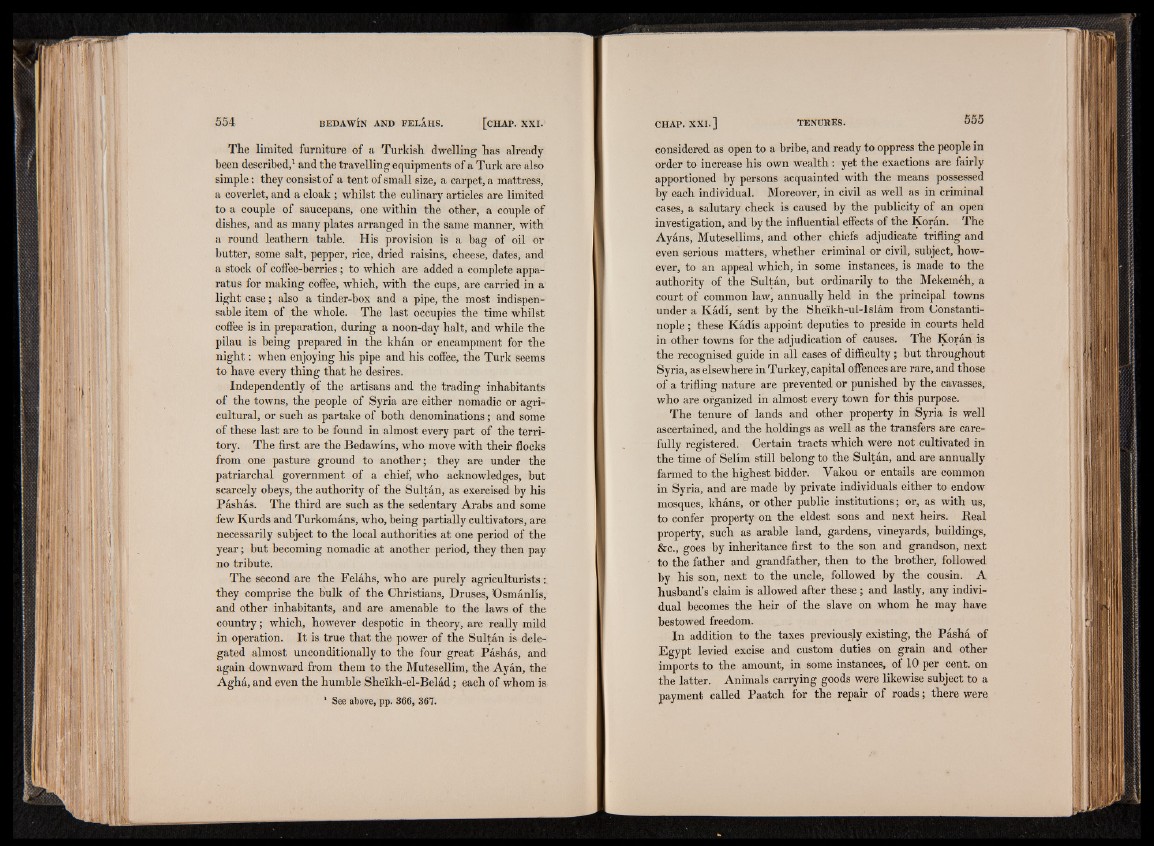
The limited furniture of a Turkish dwelling has already
been described,1 and the travelling equipments of a Turk are also
simple: they consist of a tent of small size, a carpet, a mattress,
a coverlet, and a cloak ; whilst the culinary articles are limited
to a couple of saucepans, one within the other, a couple of
dishes, and as many plates arranged in the same manner, with
a round leathern table. His provision is a bag of oil or
butter, some salt, pepper, rice, dried raisins, cheese, dates, and
a stock of coffee-berries; to which are added a complete apparatus
for making coffee, which, with the cups, are carried in a
light case; also a tinder-box and a pipe, the most indispensable
item of the whole. The last occupies the time whilst
coffee is in preparation, during a noon-day halt, and while the
pilau is being prepared in the khan or encampment for the
night: when enjoying his pipe and his coffee, the Turk seems
to have every thing that he desires.
Independently of the artisans and the trading inhabitants
of the towns, the people of Syria are either nomadic or agricultural,
or such as partake of both denominations; and some
of these last are to be found in almost every part of the territory.
The first are the Bedawins, who move with their flocks
from one pasture ground to another; they are under the
patriarchal government of a chief, who acknowledges, but
scarcely obeys, the authority of the Sultán, as exercised by his
Páshás. The third are such as the sedentary Arabs and some
few Kurds and Turkománs, who, being partially cultivators, are
necessarily subject to the local authorities at one period of the
year; but becoming nomadic at another period, they then pay
no tribute.
The second are the Feláhs, who are purely agriculturists:,
they comprise the bulk of the Christians, Druses, ’Osmánlís,
and other inhabitants, and are amenable to the laws of the
country; which, however despotic in theory, are really mild
in operation. It is true that the power of the Sultán is delegated
almost unconditionally to the four great Páshás, and
again downward from them to the Mutesellim, the Ayán, the
Aghá, and even the humble Sheikh-el-Belád; each of whom is
1 See above, pp. 366, 367.
considered as open to a bribe, and ready to oppress the people in
order to increase his own wealth: yet the exactions are fairly
apportioned by persons acquainted with the means possessed
by each individual. Moreover, in civil as well as in criminal
cases, a salutary check is caused by the publicity of an open
investigation, and by the influential effects of the Korán. The
Ayáns, Mutesellims, and other chiefs adjudicate trifling and
even serious matters, whether criminal or civil, subject, however,
to an appeal which, in some instances, is made to the
authority of the Sultán, but ordinarily to the Mekeméh, a
court of common law, annually held in the principal towns
under a Kádí, sent by the She'ikh-ul-Islám from Constantinople
; these Kadis appoint deputies to preside in courts held
in other towns for the adjudication of causes. The Korán is
the recognised guide in all cases of difficulty ; but throughout
Syria, as elsewhere in Turkey, capital offences are rare, and those
of a trifling nature are prevented or punished by the cavasses,
who are organized in almost every town for this purpose.
The tenure of lands and other property in Syria is well
ascertained, and the holdings as well as the transfers are carefully
registered. Certain tracts which were not cultivated in
the time of Selim still belong to the Sultán, and are annually
farmed to the highest bidder. Yakou or entails are common
in Syria, and are made by private individuals either to endow
mosques, kháns, or other public institutions; or, as with us,
to confer property on the eldest sons and next heirs. Real
property, such as arable land, gardens, vineyards, buildings,
&c., goes by inheritance first to the son and grandson, next
to the father and grandfather, then to the brother, followed
by his son, next to the uncle, followed by the cousin. A
husband’s claim is allowed after these; and lastly, any individual
becomes the heir of the slave on whom he may have
bestowed freedom.
In addition to the taxes previously existing, the Páshá of
Egypt levied excise and custom duties on grain and other
imports to the amount, in Some instances, of 10 per cent, on
the latter. Animals carrying goods were likewise subject to a
payment called Paatch for the repair of roads; there were